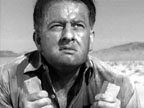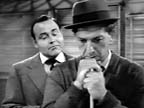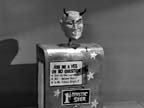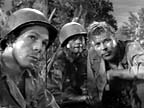Highlights from a Twilight Zone Marathon
The New Year's Eves of my youth were often spent in front of the television, watching marathons on WPIX Channel 11. The best were always the ones devoted to The Twilight Zone, a childhood favorite ever since one of my elementary school teachers spent an entire unit dissecting the show. You can imagine the impact it had on a nine-year-old boy to get to study television in school — in retrospect, that may be the first seed ever planted in this critic's head.
Watching a large chunk of a massive, two day Twilight Zone marathon on Sci-Fi Channel (with the gracious assistance of my heavily-taxed DVR box), it struck me that Rod Serling's enduring creation is a wonderful teaching tool for school kids, highly intelligent yet rooted in a world of child's logic and imaginations, where monsters (or whole other dimensions) lurk under beds, where inanimate objects have lives of their own, and where wishes can come true if not as we'd originally hoped. Most are rooted in easily recognized genres — sci-fi, horror, Westerns, crime — but they also subvert those genres in surprising ways, particularly in the series' trademark last-scene twists. Serling works in boxes kids are comfortable with and takes them outside those boxes, maybe for the first time.
Of course, in a class you watch only the best episodes. The rigors of weekly anthology television, particularly forty years ago when reruns were practically illegal, meant plenty of shows weren't classics and also accounts for the facts that most of The Twilight Zone's pyrotechnics come from the stories and the acting and not the direction or camera work. On these budgets and under thise sort of time crunch (more than thirty episodes a season, with new casts each week) there was no time for experimentation.
And that was no doubt fine with Serling, maybe the single most famous, most recognized and most "read" (if read simply means their work is digested in whatever final form the author intended) author of the twentieth century, whose focus was always on storytelling, character, and message rather than technical trickery. In 2007, it's remarkable to see how many of the episodes in this marathon bear Serling's name. Nowadays you expect to see a show runner's name on maybe two episodes a year: Serling routinely contributed ten times that. His sustained creativity is astonishing, even if a couple of episodes are mediocre and a few are absolute clunkers.
Where other shows have faded into obscurity or obsolescence, The Twilight Zone remains in the public eye — only The Honeymooners and maybe I Love Lucy are still seen as frequently and remain as revered. With an infection of the throat and little desire to party on this New Year's Eve, it seemed as good a time as any to return to an old favorite.
Submitted for your approval, then, selected favorites from a marathon, bearing in mind that a different man working with the same pool of material could have come up with a very different list. If, of course, that different man was also spending his New Year's Eve...in the Twilight Zone.
 Name: The Rip Van Winkle Caper
Name: The Rip Van Winkle CaperEpisode Number: 60
Author: Rod Serling
Synopsis: Four gold thieves put themselves to sleep for one hundred years to escape capture in the present.
Theme(s): Greed, Crime Doesn't Pay
Recurring Serling Motif: Ironic twist ending, the technique most identified with The Twilight Zone. In this case, it's an easily spotted but thoroughly satisfying one. The thieves sleep for a century, wake up in the future, kill each other off to get a bigger share of gold, and once they're all dead we learn that in the future gold is worthless. See also: "The Eye of the Beholder"
Best Bit: The leader of the thieves, Farwell (Oscar Beregi) finally collapsing in the desert, offering his last bar of gold if only someone would help him.
Why It Works: A lot of Twilight Zones squander good premises on lukewarm executions (like "The Arrival," where we're presented with a delightful puzzle, an airplane that mysteriously lands without its crew, passengers, or cargo, and the solution is totally stupid, i.e. that the whole thing is a figment in the imagination of the FAA investigator) but "The Rip Van Winkle Caper" works in reverse. It's a fairly implausible idea (so how did the bank robbers get their hands on a gas that can make them sleep, without aging, for a century?) but it's used in the service of a strong moral fable with Serling's trademark touch of dark humor, and all of the characters act exactly as they should, given their situation and attitudes.
 Name: A Game of Pool
Name: A Game of PoolEpisode Number: 70
Author: George Clayton Johnson
Synopsis: Obsessive pool player Jesse Cardiff (Jack Klugman), is sick of living in the shadow of late billiards great Fats Brown (Jonathan Winters), when the dead man appears in Jesse's pool hall for a match. If Jesse wins, he's the best pool man in history. If he loses, he also loses his life.
Theme(s): Be Careful What You Wish For, An Average Man's Desire For Greatness
Recurring Serling Motif: Another great ironic twist ending. Jesse wins the match, then discovers that being the best ain't all it's cracked up to be. See also: "Time Enough at Last"
Best Bit: The game comes down to one single ball. It's Jesse's shot. Fats starts to tell Jesse that the world is about more than pool, it's about loving, and living, and travelling. Then he flat-out cheats and drops his cue right on Jesse as he shoots, muffing his shot.
Why it Works: Though not written by Serling himself, "A Game of Pool" is classic Twilight Zone in the style of many I watched in elementary school, where the horrifying ending comes not from death or defeat, but from the hollow nature of victory. Episodes like these rise and fall on the strength of the actors — this is basically a two-character, one-act play — and Klugman and Winters both deliver fine performances. The same can also be said of the similarly themed "Last Night of a Jockey" (written by Serling) a one-character piece starring Mickey Rooney as a down-on-his-luck jockey who dreams of being big, and gets his literal wish, then realizes that no jockey has ever won a race because of his size.
 Name: Nick of Time
Name: Nick of TimeEpisode Number: 43
Author: Richard Matheson
Synopsis: A young couple (William Shatner and Patricia Breslin) stranded in a quaint Midwestern town becomes enthralled by an impossibly accurate fortune telling machine.
Theme(s): Fate, An Uncertain Future
Recurring Serling Motif: A man grows obsessed with an inanimate object that seems to take on a life of its own. These sorts of episodes, where a seemingly sane man quickly disintegrates into madness, were Twilight Zone staples; I saw at least two other very similar episodes during the marathon, including the simple but effective "The Fever" (written by Serling) about morally upright Everett Sloane losing his wallet and then his mind to a slot machine. All of these stories are warnings against some sort of compulsion: "The Fever" teaches about gambling addiction. "Nick of Time" is about blind belief in fate. See also: "The Dummy."
Best Bit: The production design of that innocuous little table-side fortune teller. The closer the camera gets to its devil's head design, the scarier it looks.
Why it Works: Some Twilight Zones are enslaved by the show's sci-fi style, but here writer Richard Matheson is free to tell a story whose biggest surprise is how little of it could only take place...in The Twilight Zone.
 Name: A Quality of Mercy
Name: A Quality of MercyEpisode Number: 80
Author: Rod Serling, from a story by Sam Rolfe
Synopsis: A bloodthirsty American lieutenant (Dean Stockwell) in the waning days of World War II demands his weary platoon charge a cave full of a few surviving Japanese soldiers until he finds himself transported three years into the past and into the Japanese unit ready to strike against depleted U.S. forces.
Theme(s): The Lunacy of War, The Desire For Greatness
Recurring Serling Motif: Genre used to talk about a hot-button issue. Today, Clint Eastwood gets (rightful) acclaim for presenting the Japanese side of World War II and suggesting the sad futility of war, but Serling imparts essentially the same message with much the same impact, in a fraction of the time and scope. See also: "I Am the Night — Color Me Black"
Best Bit: The device used to switch Stockwell's character from American to Japanese and back is a pair of damaged binoculars. An obvious metaphor but it works.
Why it Works: Because it's obvious? Why ask why. It just does.
Also watched during the marathon, in order of preference from brilliant to meh: "Will the Real Martian Please Stand Up?" "The Hitchhiker," "Where is Everybody?" "And When the Sky Was Opened," "A Piano in the House," "Walking Distance," "I Sing the Body Electric," "The Dummy," "Mirror Image," "The Last Flight," "Little Girl Lost."
Labels: The Twilight Zone

1 Comments:
I watched a few episodes during the marathon and thought about writing something up, but decided to just enjoy it.
Thanks for posting your thoughts.
Post a Comment
<< Home